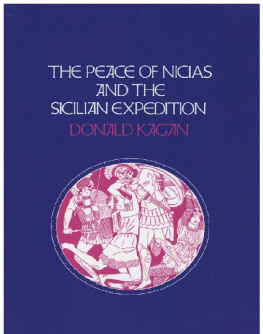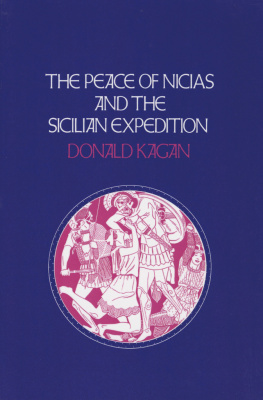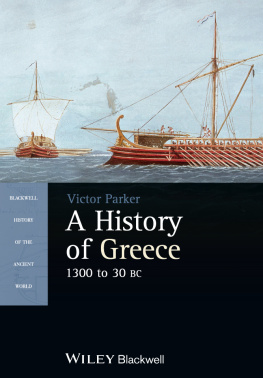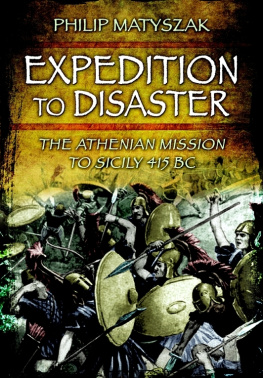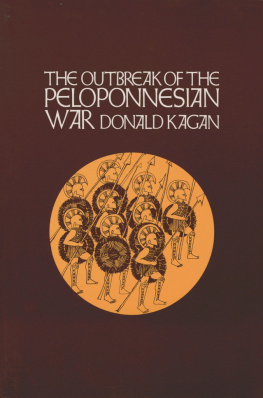Kagan - The Peace of Nicias and the Sicilian Expedition
Here you can read online Kagan - The Peace of Nicias and the Sicilian Expedition full text of the book (entire story) in english for free. Download pdf and epub, get meaning, cover and reviews about this ebook. year: 2013, publisher: Cornell University Press, genre: Politics. Description of the work, (preface) as well as reviews are available. Best literature library LitArk.com created for fans of good reading and offers a wide selection of genres:
Romance novel
Science fiction
Adventure
Detective
Science
History
Home and family
Prose
Art
Politics
Computer
Non-fiction
Religion
Business
Children
Humor
Choose a favorite category and find really read worthwhile books. Enjoy immersion in the world of imagination, feel the emotions of the characters or learn something new for yourself, make an fascinating discovery.
The Peace of Nicias and the Sicilian Expedition: summary, description and annotation
We offer to read an annotation, description, summary or preface (depends on what the author of the book "The Peace of Nicias and the Sicilian Expedition" wrote himself). If you haven't found the necessary information about the book — write in the comments, we will try to find it.
Kagan: author's other books
Who wrote The Peace of Nicias and the Sicilian Expedition? Find out the surname, the name of the author of the book and a list of all author's works by series.
The Peace of Nicias and the Sicilian Expedition — read online for free the complete book (whole text) full work
Below is the text of the book, divided by pages. System saving the place of the last page read, allows you to conveniently read the book "The Peace of Nicias and the Sicilian Expedition" online for free, without having to search again every time where you left off. Put a bookmark, and you can go to the page where you finished reading at any time.
Font size:
Interval:
Bookmark:
The Peace of Nicias and
the Sicilian Expedition
DONALD KAGAN
Cornell University Press
ITHACA AND LONDON
For my son Fred
Preface
This book is the third volume of a projected history of the Peloponnesian War, which I will complete with a fourth volume carrying the story down to the surrender of Athens in 404 B.C. The present book deals with the period from the Peace of Nicias in 421 to the destruction of the Athenian expedition against Sicily in 413. Although the period is generally divided into two parts, as it is in this book, I believe that it demonstrates a basic unity; its tale is of the failure of an unsatisfactory peace. The Sicilian expedition, though not the inevitable result of the inadequacies of the peace, arose from those shortcomings. I believe that the period is further unified by its central character, Nicias, whose policy dominated its first part, whose leadership dominated the second, and whose personality, talents, and flaws were so important for the shape and outcome of both. My purpose in this volume, as in the earlier ones, is to illuminate the course of events by examining the ancient accounts critically in order to reveal, especially, the close relationship between domestic politics and foreign policy.
For the reasons given in my preface to The Archidamian War, I have continued to follow Thucydides annalistic organization. I again treat later, non-Thucydidean sources such as Plutarch and Diodorus with respect if not, I hope, with gullibility. This practice has drawn some criticism, but my work persuades me more than ever that the ancients knew more about the fifth century than Thucydides chose, or was able, to tell us, and that careful use of other sources can increase our understanding.
I also continue to treat the speeches in Thucydides as honest attempts to produce some semblance of the arguments made in speeches that were actually given, whatever they may be in addition. I have lately tried to justify this practice in an article called The Speeches in Thucydides and the Mytilene Debate (Yale Classical Studies 24 [1975], 7194). Further arguments in defense of both practices are found at appropriate places in this volume.
Again I must acknowledge my obvious debt to the fundamental work of Georg Busolt. In this volume more than in the earlier ones I have benefited much from the perceptive and pioneering work of George Grote. There are many scholars of our own time to whom I owe important debts; among them I must give special mention to Antony Andrewes and K. J. Dover, whose work on the fourth volume of A. W. Gommes commentary on Thucydides is an indispensable aid to historians, and to Russell Meiggs and David Lewis for their edition of the Greek inscriptions.
I am grateful to Heinrich von Staden, Paul Rahe, Barry Strauss, and Alvin Bernstein for their criticism of parts or all of the manuscript. I am also indebted to the A. Whitney Griswold Fund of Yale University for defraying the cost of typing.
D ONALD K AGAN
New Haven, Connecticut
Contents
Maps
Abbreviations and Short Titles
| AHR | American Historical Review |
| AJA | American Journal of Archaeology |
| AJP | American Journal of Philology |
| ASI | E. Badian, ed., Ancient Society and Institutions |
| ATL | B. D. Meritt, H. T. Wade-Gery, and M. F. McGregor, The Athenian Tribute Lists |
| BCH | Bulletin de correspondance hellnique |
| Beloch, AP | K. J. Beloch, Die Attische Politik seit Perikles |
| Beloch, GG | K. J. Beloch, Griechische Geschichte, 2d ed. |
| BICS | Bulletin of the Institute of Classical Studies of the University of London |
| BSA | Proceedings of the British School at Athens |
| Busolt, Forsch. | G. Busolt, Forschungen zur Griechischen Geschichte |
| Busolt, GG | G. Busolt, Griechische Geschichte |
| Busolt and Swoboda, GS | Georg Busolt and Heinrich Swoboda, Griechische Staatskunde |
| CAH | Cambridge Ancient History |
| CP | Classical Philology |
| CQ | Classical Quarterly |
| CR | Classical Review |
| Davies, APF | J. K. Davies, Athenian Propertied Families |
| FGrH | F. Jacoby, Die Fragmente der griechischen Historiker |
| Forara, Generals | C. Fornara, The Athenian Board of Generals |
| Freeman, History of Sicily | E. A. Freeman, A History of Sicily |
| GHI | R. Meiggs and D. Lewis, A Selection of Greek Historical Inscriptions |
| Gilbert, Beitrge | G. Gilbert, Beitrge zur innern geschichte Athens |
| Gomme, Essays | A. W. Gomme, Essays in Greek History and Literature |
| Gomme, More Essays | A. W. Gomme, More Essays in Greek History and Literature |
| GRBS | Greek, Roman, and Byzantine Studies |
| Green, Armada | P. Green, Armada from Athens |
| Grote | George Grote, A History of Greece |
| HCT | A. W. Gomme, A. Andrewes, and K. J. Dover, A Historical Commentary on Thucydides |
| Hatzfeld, Alcibiade | J. Hatzfeld, Alcibiade: Etude sur lhistoire dAthnes la fin du V e sicle |
| Henderson, Great War | B. W. Henderson, The Great War between Athens and Sparta |
| Hignett, HAC | C. Hignett, A History of the Athenian Constitution |
| HSCP | Harvard Studies in Classical Philology |
| IG | Inscriptiones Graecae |
| JHS | Journal of Hellenic Studies |
| Kagan, Outbreak | D. Kagan, The Outbreak of the Peloponnesian War |
| Kagan, Archidamian War | D. Kagan, The Archidamian War |
| Meyer, Forsch. II | E. Meyer, Forschungen zur alten Geschichte, II |
| Meyer, GdA | E. Meyer, Geschichte des Altertums |
| PCPhS | Proceedings of the Cambridge Philological Society |
| PW | A. Pauly, G. Wissowa, and W. Kroll, Realenzyklopdie der klassischen Altertumswissenschaft |
| REG | Revue des tudes grecques |
| RIL | Rendiconti dell Istituto Lombardo, Classe di Lettere, Scienze morali e storiche |
| Riv. Fil. | Rivista di Filologia e di Istruzione Classica |
| RSC | Rivista di Studi Classici |
| Ste. Croix, Origins | G. E. M. de Ste. Croix, The Origins of the Peloponnesian War |
| TAPA | Transactions of the American Philological Association |
| Tod | M. N. Tod, A Selection of Greek Historical Inscriptions |
| Westlake, Essays | H. D. Westlake, Essays on the Greek Historians and Greek History |
Part One
The Unraveling of the Peace
In March of 421, after ten years of devastating, disruptive, and burdensome war, the Athenians and the Spartans made peace on behalf of themselves and those of their allies for whom they could speak. Weariness, the desire for peace, the desire of the Athenians to restore their financial resources, the Spartans wish to recover their men taken prisoner at Sphacteria in 425 and to restore order and security to the Peloponnesus, the removal by death in battle of the leading advocate of war in each cityall helped to produce a treaty that most Greeks hoped would bring a true end to the great war. In fact, the peace lasted no more than eight years, for in the spring of 413, Agis, son of Archidamus, led a Peloponnesian army into Attica, ravaged the land as his father had done eighteen years earlier, and took the further step of establishing a permanent fort at Decelea.
Next pageFont size:
Interval:
Bookmark:
Similar books «The Peace of Nicias and the Sicilian Expedition»
Look at similar books to The Peace of Nicias and the Sicilian Expedition. We have selected literature similar in name and meaning in the hope of providing readers with more options to find new, interesting, not yet read works.
Discussion, reviews of the book The Peace of Nicias and the Sicilian Expedition and just readers' own opinions. Leave your comments, write what you think about the work, its meaning or the main characters. Specify what exactly you liked and what you didn't like, and why you think so.

